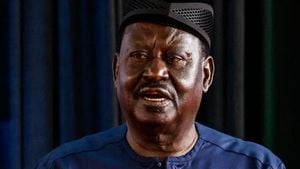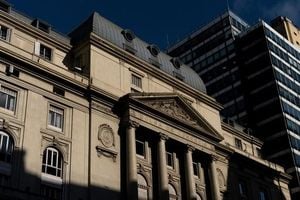Peru, a nation long known for its rich history, vibrant culture, and dramatic landscapes, now finds itself at the epicenter of another kind of drama—political upheaval. In a matter of weeks, the country has witnessed the impeachment of its president, Dina Boluarte, and the dramatic rise of Rafael Lopez Aliaga, a polarizing figure known to many simply as "Porky." With Peru's April 2026 presidential election looming, the nation is bracing for yet another seismic shift in its leadership, all while grappling with a surge in violent crime and a deepening distrust of its political class.
On Monday, October 13, 2025, Rafael Lopez Aliaga, the 64-year-old ex-mayor of Lima, resigned his post to launch his second bid for Peru’s highest office. His timing was no accident. Lopez Aliaga’s announcement came just days after Congress voted 122 to zero to impeach then-president Dina Boluarte, a move triggered by a wave of extortion rackets and a spike in violent crime that have rocked the country. According to AFP, Boluarte’s downfall was sealed after a gun attack on cumbia musicians in Lima left five people injured—a grim crescendo to a string of extortion-related shootings, including the killing of a popular singer and at least 47 bus drivers.
Boluarte, who left office with approval ratings between 2 and 4 percent (as reported by Al Jazeera), was widely criticized for her inability to curb the violence. Her government was also accused of using excessive force against protesters supporting her predecessor, Pedro Castillo, who was himself impeached and removed from office in December 2022. On the night of her ouster, a crowd gathered outside Ecuador’s embassy in Lima, fueling speculation that Boluarte might seek asylum. Yet, just days later, a Peruvian judge rejected a bid to prevent her from leaving the country as prosecutors investigate her for alleged abuse of office and money laundering. Judge Fernando Valdez ruled that Boluarte was not a flight risk, describing the prosecutor’s request as “unfounded.”
Boluarte’s legal troubles are far from over. She faces allegations of collecting money from a criminal group and failing to notify Congress during a two-week absence for rhinoplasty surgery in July 2023. Prosecutors claim she abandoned her post without appointing a caretaker president. There is also scrutiny over her collection of luxury Rolex watches, and her administration’s heavy-handed response to protests remains under investigation. Peru’s political crisis is hardly limited to the presidency: the country has cycled through seven presidents in as many years, with three ex-leaders currently behind bars and more than half of Congress under investigation for corruption, as Al Jazeera notes.
Into this maelstrom steps Lopez Aliaga, a man whose political style is as brash as his nickname. Dubbed "Porky" for his resemblance to the Looney Tunes character Porky Pig, he has not only embraced the moniker but transformed it into a potent political brand. “Porky makes him attractive to people,” political analyst Mirko Lauer told AFP, noting that the comic association allows him a certain degree of forgiveness from the public. The leader of the Popular Renewal party, Lopez Aliaga is an ultra-conservative Catholic and a member of Opus Dei. He’s also a millionaire businessman with a background in engineering, hotels, and railways—a latecomer to politics who was elected mayor of Lima in 2022.
His policy proposals are as tough as his rhetoric. Lopez Aliaga has vowed to bring back military tribunals to try extortion gangs and the hitmen they employ. “There have been military tribunals before. Let’s have them again because we’re at war,” he declared in September 2025, invoking the state’s brutal conflict with the Shining Path guerrillas of decades past. He’s also suggested sending violent criminals—whom he calls “urban terrorists”—to El Salvador’s notorious Terrorism Confinement Center, a facility championed by President Nayib Bukele for its harsh treatment of gang members.
For many Peruvians, Lopez Aliaga’s tough talk is a breath of fresh air. “He’s the only one confronting corruption at a time of huge insecurity, when nobody is doing anything for Peru,” said Isabel Silva, a 38-year-old street vendor, in an interview with AFP. His popularity is reflected in recent polls, which place him as the favorite to win the upcoming election. Yet, his methods and message have drawn sharp criticism from others, particularly outside Lima, where his approach is often seen as authoritarian.
Yovana Mendoza, who leads a group of victims of state repression in the Ayacucho region, accused Lopez Aliaga of racism and classism after he issued a decree in 2024 banning rural dwellers from entering the capital. “Mr. Porky, or Puerky as we call him, issued a decree prohibiting us rural dwellers from entering the city of Lima,” Mendoza told AFP by phone. The move, she said, was a blatant attempt to silence dissent from outside the urban elite.
Lopez Aliaga’s personal life and public persona are no less controversial. He claims to have lived a celibate life since the age of 20 and, in 2021, stated that he engages in daily mortification of the flesh to suppress sexual desire. He is staunchly opposed to abortion, which remains legal in Peru only in very limited circumstances. His combative style extends to the media as well; he’s borrowed a page from Donald Trump’s playbook by labeling critical journalists as members of the “gutter press.”
Despite his popularity, Lopez Aliaga is not without his own legal shadows. He is being investigated for alleged involvement in money laundering schemes dating back to 2012 and 2014, before his tenure as mayor. But rather than shy away from controversy, he has leaned into it. At a road inauguration in June 2025, a supporter presented him with a live pig dressed in a red superhero cape. Lopez Aliaga dubbed the animal “Worky,” a nod to what he calls his “love of work.” The spectacle, while unusual, only reinforced his image as a politician who’s willing to own his quirks and take on the establishment with humor and bravado.
As Parliament speaker Jose Jeri steps in as Peru’s interim president—the seventh in a decade—the nation stands at a crossroads. The public’s appetite for radical solutions is growing, fueled by a sense of insecurity and disillusionment with the political class. Whether Lopez Aliaga’s blend of tough-on-crime policies, populist flair, and controversial stances will be enough to unite a fractured country remains to be seen. But one thing is certain: Peru’s next election promises to be as unpredictable and contentious as the country’s recent past.
For now, Peruvians watch and wait, hoping that the next chapter will bring not just new faces, but real answers to the problems that have plagued their nation for far too long.




